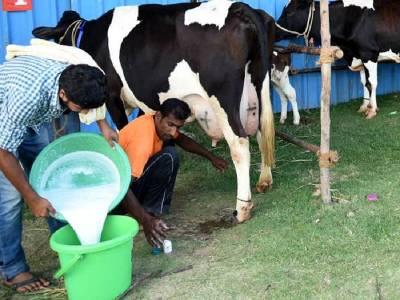Jun 25: A new study suggests drinking non-cow milk- soy, almond or rice milks - is linked to shorter kids.
The study, published in the American Journal of Clinical Nutrition, found that each daily cup of non-cow's milk consumed was associated with 0.4 centimeters (0.15 inches) lower height than average for a child's age.
"We found that children who are consuming non-cow's milk like rice, almond and soy milk tended to be a little bit shorter than children who consumed cow's milk," said Dr. Jonathon Maguire, the study's lead author and a pediatrician and researchers at St. Michael's Hospital in Toronto.
"For example, a 3-year-old child consuming three cups of non-cow's milk relative to cow's milk was on average 1.5 centimeters shorter."
That's over half an inch difference, which Maguire said is "not a tiny difference when you're 3 years old."
The study was a cross-section involving 5,034 healthy Canadian children ranging in age from two to six years old. The subjects were on average 38 months of age, with 51% being male, and were recruited from nine family and pediatric health-care practices from December 2008 to September 2015.
Of those participating, about five percent drank exclusively non-cow's milks, and about 84% drank only cow's milk; about eight percent drank both and about three precent drank neither.
Maguire said the most surprising finding was "that the amount children were shorter depended on how much they were consuming."
"It's not like if you're not consuming cow's milk, you're a little shorter," he said. "It's more like if you are consuming non-cow's milk, with each cup that a child consumes, that child on average appears to be a little bit smaller, a little shorter. That's a bit surprising."
Does it matter if a kid is half an inch shorter at the age of three? Does it correlate to height in adulthood?
"That's one remaining question. We don't know if the kids consuming non-cow's milk, maybe they catch up over time, or maybe they don't. Time's going to have to tell," he said.
"We do know in general as pediatricians that children who are on a certain percentile line in terms of height tend to stay on that line for the rest of their childhood and into adulthood."
The findings are sure to add fire to the ongoing debate about the benefits of cow's milk versus dairy alternatives.
Amy Joy Lanou, a professor of health and wellness at the University of North Carolina-Asheville who was not involved in the research, said she had several issues with the study, most notably why only milk consumption was considered.
"It's just odd to me why we wouldn't be looking at the overall diets of the children," Lanou said. "If they're making the claim that it's because it's the difference in the types of milk the kids are drinking, well, what else are they eating?"
Lanou, whose research has led her to believe that cow's milk is "not a necessary food," said she believes the study makes an improper leap by implying that taller means healthier.
"Taller children and heavier children are not necessarily healthier adults, or even healthier children," she said. "I think they're using height as a marker for health, and I'm not sure that's appropriate."
Connie Weaver, a professor of nutrition science at Purdue University who was also not involved in the study, said she found it interesting.
"This is the first study that I recall directly comparing cow milk with plant-based beverages for a physiological benefit," she wrote in an email. "We know that some of the plant beverages, almond especially, have lower protein contents so I have speculated that calcium absorption may be lower. This would suggest that cow's milk is superior."
However, she says, "A wrong message would be if people who do not consume cow's milk would decide to avoid the plant-based milks also."
The study suggests that one reason for the difference in height might be that plant-based milks do not stimulate insulin-like growth factor, or IGF, production as well as cow's milk does. Studies have found that adults with higher levels of certain IGFs have increased risks of reproductive cancers.
"Having less IGF may compromise height but that may lower risk of fracture -- and some cancers, too," Weaver said.
Overall, she would advise parents that "cow's milk may be the best option, but plant-based beverages provide many needed nutrients like protein, calcium, magnesium, potassium," which is far better than what most kids might prefer to drink.
Lanou would tell parents who are already giving plant-based milks to their children not to worry -- but to make sure their kids are getting enough protein from other sources throughout the day.
Maguire said he'd like to see soy, almond and rice milks more tightly regulated to bring the industry, in line with cow's milk.
"As a consumer and as a parent, you have to be pretty savvy when going to the grocery store to choose a non-cow's milk beverage that has similar nutritional value as cow's milk," he said. "Many of those beverages are marketed as being equivalent to cow's milk when they're not."





Comments
Add new comment